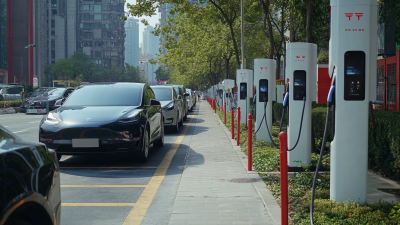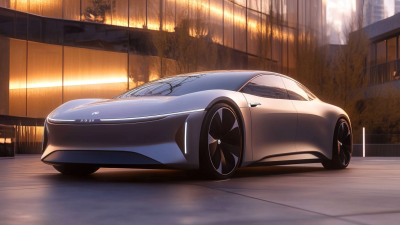Leave Your Message
As the automotive industry shifts towards sustainability, the popularity of cars with electric powertrains has surged, with sales projected to reach 30% of the total vehicle market by 2030, according to the International Energy Agency. With numerous models available ranging from compact cars to luxury SUVs, choosing the right electric car tailored to your lifestyle and needs can be overwhelming. Factors such as daily commuting distance, access to charging infrastructure, and your personal budget play crucial roles in this decision-making process. Additionally, a report by McKinsey & Company emphasizes that consumer preferences are increasingly leaning towards electric vehicles due to their lower operating costs and environmental benefits. This blog will guide you through essential considerations to help you make an informed choice when selecting cars with electric capabilities, ensuring that you find the perfect match for your everyday requirements.

When choosing the right electric car for your lifestyle, it's crucial to understand your daily driving habits and distances. Evaluate how far you typically travel each day—whether it’s a short commute to work, running errands, or weekend road trips. This understanding will help you select an electric vehicle (EV) with an appropriate range. For instance, urban drivers may do well with a model that has a range of around 150-200 miles, as daily drives are usually short, while those who often take longer trips might prefer an EV that offers 250 miles or more on a single charge.
Incorporating safe driving habits is equally important as you adapt to an electric vehicle. One common issue on the road is tailgating, where drivers follow too closely behind the vehicle in front of them. This behavior can lead to dangerous situations, especially for EVs that may have slower acceleration compared to traditional gasoline cars. Familiarizing yourself with safe following distances can enhance your driving experience while promoting safety on the roads. As you consider an EV, remember that driving habits and vehicle range are central to making the best choice for your needs.
 When selecting the right electric car for your lifestyle, understanding battery range and charging options is crucial. The first step is to assess your daily driving habits. If you typically drive short distances, a vehicle with a range of 150-200 miles may suffice, allowing you to recharge overnight at home. However, for frequent long drives or commutes, investing in a model that offers 300 miles or more would provide the peace of mind needed for extended trips without constant charging interruptions.
When selecting the right electric car for your lifestyle, understanding battery range and charging options is crucial. The first step is to assess your daily driving habits. If you typically drive short distances, a vehicle with a range of 150-200 miles may suffice, allowing you to recharge overnight at home. However, for frequent long drives or commutes, investing in a model that offers 300 miles or more would provide the peace of mind needed for extended trips without constant charging interruptions.
Next, consider your charging options. Home charging is the most convenient solution, but you should evaluate your existing electrical infrastructure. If you can install a Level 2 charger, you can enjoy quicker charging times. Alternatively, investigate nearby public charging stations to determine availability. Many electric vehicles support fast charging, which can significantly reduce downtime during road trips. Understanding both your driving patterns and charging capabilities will help you select an electric car that aligns perfectly with your needs.
Choosing the right electric car (EV) goes beyond just considering its price and range; it’s essential to prioritize key features that fit your lifestyle. Space is critical, especially for families or individuals who often travel with passengers or cargo. According to a recent study by the International Council on Clean Transportation (ICCT), the average electric vehicle offers about 55 cubic feet of cargo space when the rear seats are down, making it comparable to many SUVs. This ample space allows for flexible packing for weekend getaways or daily commutes.
Comfort is another vital factor. With many electric models focusing on rider experience, features such as ergonomic seating, climate control, and noise reduction have come to the forefront. Data from J.D. Power’s 2023 U.S. Electric Vehicle Experience (EVX) Ownership Study shows that owners prioritize comfort and ride quality, rating these aspects higher in hybrids and SUVs than in traditional sedans. Additionally, technology plays a significant role in enhancing comfort and convenience. The rise of advanced driver-assistance systems (ADAS) has made innovative features like adaptive cruise control and lane-keeping assistance standard in many EVs. According to McKinsey & Company, about 60% of EV buyers consider sophisticated technology features as a primary driver in their purchasing decisions, underlining the importance of selecting a car that fits both your practical needs and tech-savvy expectations.
When considering budgeting for an electric vehicle (EV), it’s essential to weigh the initial costs against long-term savings meticulously. While EVs often come with a higher price tag upfront, they can offer significant savings over time through reduced fuel expenses and lower maintenance costs. This total cost of ownership should be a major factor in your decision-making process. Factors such as local charging infrastructure, government incentives, and fuel prices can greatly influence your overall budget.
In Malaysia, the shift towards electric vehicles is accompanied by the rising popularity of Hybrid/HEV (Hybrid Electric Vehicles). These vehicles serve as a bridge for those who are hesitant to fully embrace electric vehicles due to initial costs or range anxiety. They offer the benefits of both gasoline and electricity, potentially reducing fuel expenses while providing the convenience of traditional vehicles. For budget-conscious buyers, HEVs might present a more practical option that meets their needs without the full commitment to an all-electric vehicle just yet. As the EV market continues to evolve, it's crucial to assess which type of vehicle aligns better with your lifestyle and financial goals.

When considering eco-friendly vehicle choices, sustainability is a crucial factor that not only impacts the environment but also shapes your driving experience. Electric cars are a significant step towards reducing carbon footprints, as they emit zero tailpipe emissions. However, it's essential to consider the entire lifecycle of the vehicle—from manufacturing to disposal. Opt for electric vehicles that use sustainable materials and have a transparent supply chain committed to ethical practices.
Tip 1: Research the manufacturer's environmental policies. Many companies provide insights into their sustainability practices, including how they source materials and manage waste during production. Choosing brands with strong commitments to eco-friendly practices ensures that your car aligns with your values.
Tip 2: Consider the vehicle's energy efficiency and battery disposal options. Look for cars that feature longer battery life and efficient charging systems. Additionally, investigate how the manufacturer handles battery recycling, as proper disposal is critical in minimizing environmental impact.
Tip 3: Evaluate the local infrastructure for electric vehicles. Check if your region has ample charging stations and support systems for electric cars. The availability of renewable energy sources can also enhance the sustainability of your vehicle, so consider regions moving towards green energy initiatives for a more beneficial impact.
| Feature | Compact Car | SUV | Sedan | Range (Miles) |
|---|---|---|---|---|
| Passenger Capacity | 4 | 5-7 | 5 | 150-300 |
| Cargo Space (cu ft) | 12 | 30-40 | 15-20 | N/A |
| Estimated Cost ($) | 30,000 | 40,000 | 35,000 | N/A |
| Charging Time (Hours) | 4-8 | 6-10 | 4-8 | N/A |
| Eco-Friendly Rating | High | Moderate | High | N/A |






